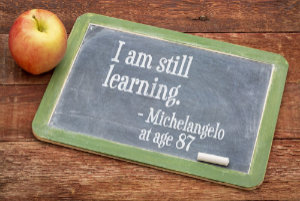 The Essence of the Coaching Relationship
The Essence of the Coaching Relationship
As wellness and health coaching grows and organizations look for more and more cost-efficient ways to provide these services the quest is for that elusive optimal combination of efficiency and effectiveness. How to make wellness coaching scaleable to a large population remains a quandary. How long does wellness coaching take? How many sessions? How many minutes?
The temptation is to down-size. The mistake is to “dumb-size”. Bottom line is, like always, you get what you pay for. If a coaching program is not careful at maintaining quality it may degenerate into the information-based programs that coaching was designed to supplement and replace. The computer-assisted programs are just that…assistants to the real-live coach who is working with their client. Let’s remember why we went to coaching in the first place…we discovered that people change more effectively when they go through the change process with an ally. What makes that ally effective? For that I propose a small stretch over to the world of counseling psychology, which has been studying what facilitates behavioral change since it’s inception as a professional discipline.
I am a counseling psychologist and the foundation of my training was in the research that looked at what it was that allowed therapists of many different theoretical schools to get effective results. In the late 1960’s and early 1970’s, Three academics, Robert Carkhuff, Bernard Berenson and Charles Truax took the work of Carl Rogers and made it objective enough to study through behavioral science. What they found was that regardless of what approach to therapy someone took (psychoanalytic, behavioral, gestalt, client-centered, etc.), their effectiveness came down to their ability to provide what Rogers called “the facilitative conditions of therapy”. When a therapist provided empathy, unconditional positive regard, and was authentic and genuine in their interactions with the client, the therapy worked, regardless of theoretical orientation. Since those days we have seen other research substantiate this and point to the “therapeutic relationship” as the key determinate of therapeutic effectiveness (In 2001 Hazler and Barwick summarize much of this in their book, The Therapeutic Environment:Core Conditions For Facilitating Therapy.)
As the field of coaching evolved the term that has often been used to describe this way of being as opposed to the techniques of doing is coaching presence. However even the ICF definition of coaching presence comes up short “Ability to be fully conscious and create spontaneous relationship with the client, employing a style that is open, flexible and confident.” When I have been complimented about my coaching presence from a piece of coaching I have done in a public demonstration it felt like what was coming through was largely what I would call the facilitative conditions of coaching.
To me “coaching presence” is about providing through your own way of being with your client, the conditions which allow them to maximally open up to their own growth process. To do that your client needs to feel safe, to feel heard and understood. They need to feel in connection with, accepted by and receiving compassion from the coach.
“When we come into contact with the other person, our thoughts and actions should express our mind of compassion, even if that person says and does things that are not easy to accept. We practice in this way until we see clearly that our love is not contingent upon the other person being loveable.”
Thich Nhat Hahn
Buddhist monk Thich Nhat Hahn provides a powerful description of unconditional positive regard. We meet our client where they are at without judgment. We notice, we observe but we don’t judge, even in our own minds. This is the separation between who a client is, and what they do. We may challenge them to look at how a particular attitude, belief or behavior is working for them or against them, but we are still accepting them as a person on the journey of growth.
Empathic understanding is a very direct way to express this unconditional positive regard. Empathy is conveying to the other person that you know, at least to some degree, what it is like to feel what they are feeling. You may have never had their exact experience (e.g. having a heart attack, being obese, etc.) but you know what it is like to feel fear, loss, shame, regret, etc. You put yourself in their place and see the world from their perspective tapping into your own feelings so as to connect with them deeply.
Authenticity and genuineness are not techniques, they are ways of being. Sincerity cannot be faked. If your heart is not in the coaching process, don’t coach. Take a day off, or if it’s not just a temporary experience, look for a new career. Most people, including all of our clients, have terrific “BS” detectors and know when someone if just going through the motions of being a helper. Likewise when they experience you being your authentic self it gives them someone they are attracted to working with and feel safe enough to trust with their feelings, hopes, dreams and fears.
In wellness coaching our clients have often tried and failed at lifestyle improvement before, sometimes many times. For them to go further towards success they have to feel like they can truly trust the ally that is journeying with them. They have to feel like this ally genuinely cares about them, completely accepts them as a person, understands their experience and is not afraid to go wherever the journey takes them. The coaching relationship is the heart and soul of the coaching process. A competent coach has skills, techniques, tools and methodology to help their client on their journey, but it is their way of being that is the crucial difference. The client/coach connection is omnipresent and foremost in the client’s mind. For the coach it is as easy as just being real, it is as tough as Tich Nat Hahn says, loving what appears unlovable.
“The most precious gift we can offer others is our presence. When mindfulness embraces those we love, they will bloom like flowers.”
-Thich Nhat Hahn
Michael Arloski, Ph.D., PCC













